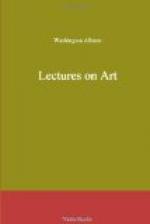And here, as the Idea of Angels is universally associated with every perfection of form, may naturally occur the question so often agitated,—namely, whether Beauty and Sublimity are, under any circumstances, compatible. To us it seems of easy solution. For we see no reason why Beauty, as the condition of a subordinated object or component part, may not incidentally enter into the Sublime, as well as a thousand other conditions of opposite characters, which pertain to the multifarious assimilants that often form its other components.
When Beauty is not made essential, but enters as a mere contingent, its admission or rejection is a matter of indifference. In an angel, for instance, beauty is the condition of his mere form; but the angel has also an intellectual and moral or spiritual nature, which is essentially paramount: the former being but the condition, so to speak, of his visibility, the latter, his very life,—an Essence next to the inconceivable Giver of life.
Could we stand in the presence of one of these holy beings, (if to stand were possible,) what of the Sublime in this lower world would so shake us? Though his beauty were such as never mortal dreamed of, it would be as nothing,—swallowed up as darkness,—in the awful, spiritual brightness of the messenger of God. Even as the soldiers in Scripture, at the sepulchre of the Saviour, we should fall before him,—we should “become,” like them, “as dead men.”
But though Milton does not unveil the “face like lightning”; and though the angel Raphael is made to hold converse with man, and the “severe in youthful beauty” gives even the individual impress to Zephon, and Michael and Abdiel are set apart in their prowess; there is not one he names that does not breathe of Heaven, that is not encompassed with the glory of the Infinite. And why the reader is not overwhelmed in their supposed presence is because he is a beholder through Adam,—through him also a listener; but whenever he is made, by the poet’s spell, to forget Adam, and to see, as it were in his own person, the embattled hosts....
If we dwell upon Form alone, though it should be of surpassing beauty, the idea would not rise above that of man, for this is conceivable of man: but the moment the angelic nature is touched, we have the higher ideas of supernal intelligence and perfect holiness, to which all the charms and graces of mere form immediately become subordinate, and, though the beauty remain, its agency is comparatively negative under the overpowering transcendence of a celestial spirit.




